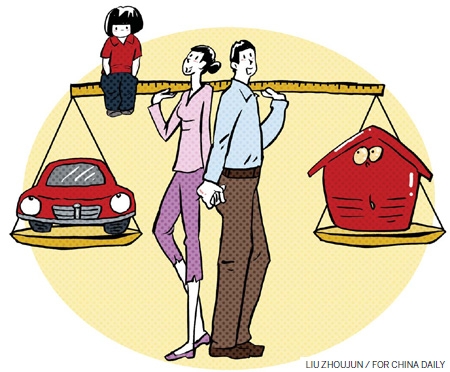China
Second child? One is enough!
By Wang Hongyi (China Daily)
Updated: 2010-12-17 14:14
 |
Large Medium Small |

Sometimes Yvonne Gao envies mothers who have only one child, though she said her twin daughters have brought a lot of fun and happiness.
The 32-year-old, who works at a cosmetics company in Shanghai, gave birth to twin girls two years ago.
"My life was completely changed when my girls came into the world," she said. "It is great and sweet to see them growing up every day. But that's just one side of the coin."
She said the high costs of raising two babies are the main reasons why she is so bittersweet. In recent years, Shanghai has encouraged eligible couples to have a second child as part of its efforts to tackle the burden of an aging population. In China, urban parents are allowed to have two children if they are both only children; rural parents are allowed a second if their first is a girl.
As the country's most densely populated city, Shanghai now has more than 3 million registered residents aged 60 and above, about one-fifth of its total population. That proportion is expected to reach a third in the next 10 years.
The problem is not merely Shanghai's alone. According to Reuters, China will have about 1.6 working-age adults to support every person aged 60 and above, compared with 7.7 in 1975.
But Gao said she is under extreme financial pressure. She said the costs of raising the twin babies amount to about 3,000 yuan (450 euros) to 4,000 yuan each month, nearly her entire monthly income.
"Diapers, powdered milk, clothing it's all about money. And the prices continue to go up because of inflation. These will become difficult to afford in the future," she said. "When they go to kindergarten, there will be more expenses."
Gao said the birth of twins also puts pressure on her husband, an office worker, to work harder and earn a bigger paycheck.
"If I had a choice, I prefer to have had only one baby. I'll have less stress," she said. "Raising a child, let alone two, is a big burden on your life."
Gao's sentiment about a preference for only one child is not isolated. A recent survey by the Shanghai Youth Research Center showed that nearly 70 percent of residents in the country's financial hub said they were unwilling to have a second child, though an overwhelming majority of them admitted that they enjoyed raising children and seeing them grow.
In the survey, they said the high costs of raising a child compelled them to abandon the idea of having a second.
The average monthly costs of the survey's participants was 1,700 yuan, accounting for more than 44 percent of their disposable income.
Xie Lingli, director of the Shanghai Population and Family Planning Commission, said that more births are being encouraged to help alleviate a possible workforce shortage in the near future.
"The rising number of aging people will bring many problems in the future," Xie said. "Our first imperative is that more effective ways should be worked out to solve the problem.
She added that so far there is no plan to change the current family planning policy.
Officials from family planning departments in the city have said that they will carry out home visits and counseling services to couples to encourage them to have second child.
Even so, the reaction from young couples in the city seems tepid.
"It may be a happy life when you have more children ... but I just toy with such an idea. After all, the harsh reality does not allow us to do that," said a local resident surnamed Wang. He and his wife are both from one-child families.
"After all," he said, "it is stressful raising a child today."
The financial burden of raising a family has compelled many young couples to depend on their parents for support, practically and financially, in raising their grandchildren. Media reports said more than 40 percent of young couples said their children were raised by grandparents who also paid most of the children's expenses.